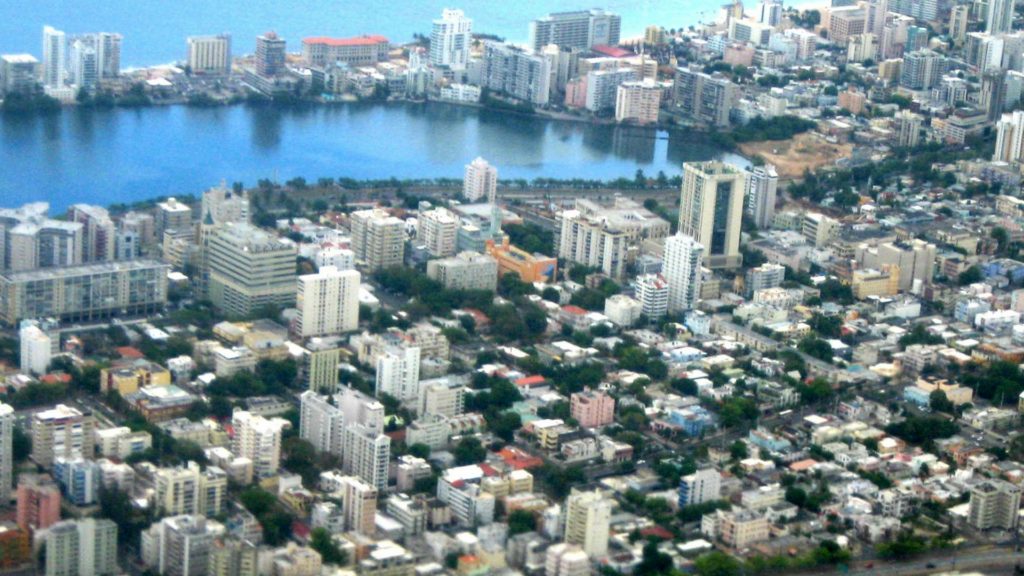Millionaires and billionaires see the opportunity to avoid taxes in Puerto Rico as strong incentives for business.
One of them is economist and entrepreneur Peter Schiff, who — despite the economic turmoil and governmental instability on the island territory — moved his business and bought property in Puerto Rico.
Sporting a tan and a smile during an interview with Joe Rogan on his podcast, the Joe Rogan Experience, Schiff explained that American citizens who wish to move from the mainland could enjoy certain tax advantages in Puerto Rico you don't get in the United States.
"I have two businesses down there now, I'm hiring people, I'm renting space, [and] and I bought a lot of property down there," Schiff said. "As more and more people like me continue to go to Puerto Rico, the economy is going to improve." Schiff even said that "big government destroyed the Puerto Rican economy," and that bringing external investment to the island will help with recovery of the economy.
The reason individuals like Schiff invest in Puerto Rico is because of the many tax advantages that accompany the act of moving your business to the island. The incentives seem to outweigh the negatives.
A Tax Shelter
Even when the government of Puerto Rico is forced to ration water for residents and the federal interference has escalated, most American citizens in Puerto Rico avoid taxes paid to the federal government. The only thing that impacts a tax burden in the Commonwealth is the taxes of the local governments and a few select federal taxes, like payroll taxes, that impact income earnings.
Because of this scheme, billionaires from the mainland view living and doing business from Puerto Rico as a strategy to circumvent and alleviate individual tax burdens. CNN Money reports that "250 people with a net worth of $1 million have moved to the island since... 2012." Billionaire John Paulson is also one of the few people going for the tax breaks.
Federal Taxation In Puerto Rico
According to the Internal Revenue Service, residents of Puerto Rico are exempt from federal income taxes while a select few are not.
The IRS states:
"In general, United States citizens and resident aliens who are bona fide residents of Puerto Rico during the entire tax year, which for most individuals is January 1 to December 31, are only required to file a U.S. federal income tax return if they have income sources outside of Puerto Rico or if they are employees of the U.S. government. Bona fide residents of Puerto Rico generally do not report income received from sources within Puerto Rico on their U.S. income tax return."
Simply put, any income earned within Puerto Rico is not taxed by the federal income tax regime. And, for nonresidents of Puerto Rico, income earned within the commonwealth can be claimed as a foreign tax credit on a tax return.
Despite the exemption of a federal income tax, the Commonwealth's tax system serves as a hybrid of U.S. taxes and Puerto Rican taxes. Residents still have to pay into Social Security and Medicare for income earned within the territory. Other federal taxes that Puerto Ricans have to pay into include import/export taxes, Federal commodity taxes, among others.
However, the general sentiment is that the federal tax burden is dramatically less than states on the mainland―minus taxes mandated under the Federal Insurance Contributions Act and the Federal Unemployment Tax Act.
Commonwealth Taxation
Excluding federal taxes, the tax burden levied by the Puerto Rican government is very dismal, according to an editorial in Forbes (see "In Support" below). All federal employees who are residents, those who do business with the federal government, and any Puerto Rico-based corporations that do business in the U.S., all pay federal income taxes.
However, for those who don't meet this criterion, the cutoff point for the Commonwealth income tax is much lower than the federal rate because of the lower incomes per-capita. The maximum income tax rate is only 33 percent for internal wage earners, according to the Internal Revenue Code of Puerto Rico.
The same revenue code serves as the leading body of tax laws for the entire island. Levying a variety of Commonwealth-level taxes, the tax code mandates statutory excise taxes, estate taxes, gift taxes, and internal payroll taxes.
Sales and use taxes are also in effect. Given the economic and taxation success of certain localities on the island, the Legislative Assembly of Puerto Rico established a sales and use tax that touched every governmental entity. Rates at the state level went up to 6 percent while municipalities were required to levy a 1 percent minimum rate.
Local governments, also, collected sales taxes through ordinances intended to support infrastructure and economic development. In April of 2016, the sales and use tax model was rendered defunct as the implementation of a value-added tax (VAT) on goods and services. The move was controversial and costly. So, the VAT model ended, and the Puerto Rican government reinstalled the sales and use model.
Opinions on Puerto Rico's Tax Scheme
In Support
- "Puerto Rico also has great incentives for business owners. If you have a business that can be moved, that can be a real tax home run both for you and the company." - Robert Wood, Forbes op-ed, 2014. In this opinion piece, wood also pointed out that the environment for business owners should be incentive enough to open up shop in Puerto Rico. He wrote: "You’ll get: Tax-free interest and dividends earned after you become a resident, no long-term capital gains tax on appreciation after you become a resident., [and] 5% tax on long-term capital gain for appreciation before you move for any sales during your first 10 years as a resident."
In Opposition
- "We should not allow the thousands of millionaires residing on the island to get the best of both worlds: U.S. citizenship without having to pay federal income taxes. This gravy train for Puerto Ricans should end immediately. If Puerto Ricans don’t like this, they can advocate for statehood or an independent republic — but the federal government shouldn’t be supporting a Caribbean welfare paradise." - Francisco A. Rullan, Regional VP of the Puerto Rican Bar Association of Florida, Daily Caller op-ed, 2011.
Recommended Reading:
- Internal Revenue Service - Topic 902 - Credits and Deductions for Taxpayers with Puerto Rican Source Income Exempt from U.S. Tax
- Internal Revenue Services - Special Instructions For Bona Fide Residents Of Puerto Rico Who Must File A U.S. Individual Income Tax Return
- Puerto Rico Department of Finance (Spanish)
Would you move to Puerto Rico for the tax benefits? Tell us your thoughts in the comments below.
MORE POLICY DISCUSSIONS ON CAPITALISM.COM:
• What Are Small Businesses’ Healthcare Options Beyond Obamacare?
• This Is Why There’s No Minimum Wage in Singapore
• Idaho Lt. Gov. Candidate Stumping for Registered Apprenticeships








